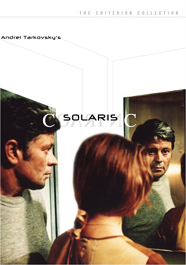The sudden downpour which follows, one of the elements which frequently appears in Tarkovsky's films, has often been interpreted symbolically by critics, much to Tarkovsky's dismay. Complaining in Sculpting in Time that he is repeatedly asked what rain, fire, and water mean in his films, he retorts:
In Russia you have those long, persistent, dreary rains. And I can say that I love nature. I don't like big cities, and feel perfectly happy when away from the paraphernalia of modern civilization. Just as I felt wonderful in Russia when I was in my country house with 300 kilometers between Moscow and myself—rain, fire, water, snow, dew, the driving ground wind—all are part of the material setting in which we dwell, I would even say of the truth of our lives.
I am therefore puzzled when I am told that people cannot simply enjoy watching nature when it is lovingly reproduced on the screen, but have to look for some hidden meaning it must contain.
[Commentary by Graham Pride]
This, however, is somewhat disingenuous, given the multiple and inescapable associations that the natural elements have accumulated in myth, folklore, religion, literature, and art; and the well educated Tarkovsky must have been aware of these.
Here, for example, the rain appears to have a cleansing effect on Kris, who literally immerses himself in an element he won't be able to experience in space.
[Commentary by Vida Johnson; emphasis added]
So after a long and well-reasoned statement by the creator of the film about over-reaching symbolism, Vida Johnson dismisses Tarkovsky out of hand in order to preserve a particular strain of criticism that apparently needs over-reaching symbolism to survive. I would've hoped that by the time students finish their undergraduate work, such tendencies would have been trained out of them. Back to Poetry 101, I guess.
I'm perfectly willing to admit that a writer, artist, composer or director may at times say more or less than intended. But to divorce the finished work from any light the creator might bring to bear on his creation simply because one doesn't agree with his approach, that's hubris. It is tantamount to saying: Everyone else played the game, Tarkovsky. You must also.







